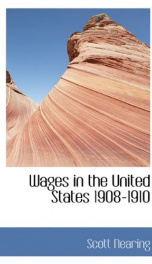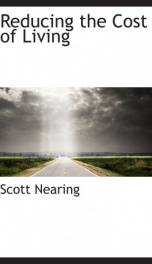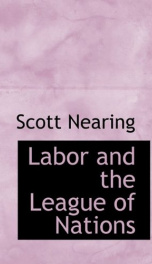Nearing Scott
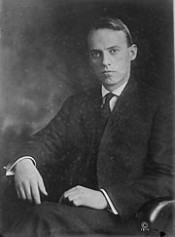
Scott Nearing (August 6, 1883 – August 24, 1983) was an American radical economist, educator, writer, political activist, and advocate of simple living. Nearing was born August 6, 1883 at Morris Run, Tioga County, Pennsylvania, the heart of the state's coal country. Nearing's grandfather, Winfield Scott Nearing, had arrived in Tioga County with his family in 1864, at the age of 35, when he accepted a job as a civil and mining engineer. Before the end of the year he had assumed full control of mining operations as the superintendent of the Morris Run Coal Company, a position of authority which he held for the remainder of his working life.[1] An intense, driven man, Scott Nearing's grandfather studied science and nature, practiced gardening and carpentry, and regularly received crates of books from New York City, amassing a large personal library.[2] In his memoirs written late in his life, Scott Nearing would recall his grandfather as one of the four most influential figures in his life.[3] Nearing's upbringing was that of a young bourgeois, his mother employing a part-time tutor and two Polish servants to clean the gleaming white house atop a hill overlooking the town.[4] Scott's brother recalled that the citizens of Morris Run had treated the handsome and intelligent Scott "the way they would treat the heir to the nobleman.... They all treated him with awe."[4] Nearing's father was a small businessman and stockbroker, his mother a vigorous, energetic, and idealistic woman who Nearing later credited for providing an appreciation of the higher things in life — nature, books, and the arts.[5] Despite an upbringing in a life of privilege made possible at some level by the harsh anti-union politics of his patriarchal grandfather,[6] young Scott Nearing nevertheless developed a social conscience, which one of his biographers describes as "a burr under his skin that none of his relatives acquired and that no interpretation satisfactorily explains."[4] Scott Nearing's radical worldview would stay with him for the rest of his life. Nearing graduated from high school in 1901 and enrolled in the University of Pennsylvania Law School, "where corporate bias so violated his idealism that after one year he quit."[7] Instead he studied oratory at Temple University in Philadelphia and enrolled in the Wharton School of Business of the University of Pennsylvania, where he immersed himself in the emerging science of economics. At the Wharton School, Nearing was deeply influenced by Simon Nelson Patten, an innovative and unconventional educator and founding father of the American Economic Association.[8] Nearing was molded as a "Wharton man" for the current progressive era, one of the proverbial "best and brightest" trained in practical economics to be readied for a place as a responsible leader of the community.[9] In the words of another of his students, Patten taught innovative thinking — "making use of creative intelligence to master new situations irrespective of received dogma."[10] Nearing seems to have found these new intellectual tools for potential social change to be exciting and liberating. He completed his undergraduate program in just three years, while simultaneously engaging in campus politics and competitive debate.[8] Nearing received his BS degree from the University of Pennsylvania in 1905 and his PhD in Economics in 1909. From 1905 to 1907, he served as the Secretary of the Pennsylvania Child Labor Committee, a volunteer society working to solve the child labor problem in the state.[11] From 1908 until 1915, Nearing himself taught economics and sociology at the Wharton School and Swarthmore College, authoring a stream of books on the economics and social problems.[12] Nearing was a staunch advocate of a "new economics" which insisted "that the economists part company with the ominous pictures of an overpopulated, starving world, prostrate before the throne of 'competition,' 'individual initiative,' 'private property,' or some other pseudo-god, and tell men in simple, straightforward language how they may combine, re-shape, or overcome the laws and utilize them as a blessing instead of enduring them as a burden and a curse."[13] Much as Karl Marx drew radical implications from the ideas of the conservative Hegel, Nearing took the economic logic of his department head, Simon Patten, and made radical inferences about wealth and the distribution of income that his mentor had himself hesitated to draw.[14] He believed that unfettered wealth stifled initiative and impeded economic advancement, and hoped that progressive thinkers among the ownership class itself would come to realize the negative impact of economic parasitism and accept their civic duty of enlightened leadership.[15] Nearing instead outlined an economic republicanism based upon "four basic democratic concepts — equality of opportunity, civic obligation, popular government, and human rights."[16] Nearing's aggressive social activism in the classroom and through the printed word brought him into conflict with his own employers at the University of Pennsylvania's Wharton School of Business, resulting in his dismissal and his emergence as a cause célèbre of the American radical movement for the next decade. On the morning of June 16, 1915, Nearing's secretary telephoned him to report that a letter from the Provost had arrived, which noted that "as the term of your appointment as assistant professor of economics for 1914-1915 is about to expire, I am directed by the trustees of the University of Pennsylvania to inform you that it will not be renewed."[17] The Board of Trustees of the University of Pennsylvania was heavily stacked with bankers, corporation lawyers, financiers, and corporation executives, and Nearing's writing had not gone unnoticed.[18] Nearing's tenuous situation had been exacerbated by an open letter to The North American in which he challenged the right wing evangelist Billy Sunday to apply the Gospel to the conditions of industrial capitalism, including "the railroad interests... the traction company... the manufacturers... the vested interests."[19] Reaction to Nearing's dismissal from the academy was swift, with department head Patten and others issuing statements condemning the decision. Progressives in the Wharton School quickly compiled a summary of the facts of the case and sent it to 1500 newspapers, journals, and academics around the country.[20] Even conservatives in the faculty were deeply troubled since, as one Wharton professor observed, "the moment Nearing went, any conservative statement became but the spoken word of a 'kept' professor."[20] Conversely, some radicals were satisfied for being validated in their belief of the conservative nature of the American academy. Socialist writer Upton Sinclair told Nearing in no uncertain terms in an open letter that "You do not belong in a university. You belong with us Socialists and free lances.... Instead of addressing small numbers of college boys, you will be able to address large audiences of men."[21] Retrospectively called by one historian "the most famous breach of academic freedom" of the era,[22] the University of Pennsylvania's action had the effect of making Scott Nearing into a public figure and fueled a long-running discussion about the proper role and rights of the teacher. From the Fall of 1915, Scott Nearing was established as a radical "public man." He joined the American Union Against Militarism in 1916 and delivered a series of speeches condemning the "Preparedness" campaign then being promoted by Woodrow Wilson and the nation's political elite.[23] He also remained a university professor, teaching Social Science at city-owned Toledo University from 1915 through 1917. The intense nationalistic feeling that swept the country now that America was embroiled at last in the war in Europe spelled the end of Nearing's Toledo days, as he later recalled in his memoirs: Nearing packed up his things and moved to New York City, where he became a founding member of the broad anti-war organization the People's Council, the establishment of which took place at the so-called First American Conference for Peace and Democracy, held May 30-31, 1917. He assumed the chairmanship of that organization that fall.[25] On July 1, 1917, Nearing joined the Socialist Party and began a new job, working for the next six years as a lecturer in Economics and Sociology at the Socialist Party's Rand School of Social Science.[26] He was a prolific public speaker during this time, estimating that he had given approximately 200 speeches a year during the war years.[27] Nearing authored a series of pamphlets, published by the Rand School, one of which, The Great Madness: A Victory for the American Plutocracy, resulted in his indictment under the Espionage Act for alleged "obstruction to the recruiting and enlistment service of the United States."[28] This indictment came down in April 1918, but it was not until February 1919 — that is, several months after the war in Europe had actually ended — that the trial against Nearing and the Rand School actually commenced.[29] The prosecution attempted to show that Nearing, by writing against militarism, had illegally interfered with the ability of the United States government to recruit and conscript troops for its military activities in Europe. It spent its effort making Nearing admit that he had written and spoken against militarism and the war in Europe — which he was quite willing to do. But at the end of the trial, Nearing addressed the jury and made a key point: "The prosecution has not been able to show a single instance in which recruiting was obstructed. They have not been able to show a single instance in which insubordination, disloyalty, and refusal to duty was caused."[30] Nearing noted the evil implications of the government's attempt to illegalize written dissent: The judge in the case, Julius M. Mayer, dismissed the first two counts of the indictment, alleging conspiracy, without sending them to the jury. Following deliberation, the jury found Scott Nearing not guilty but the American Socialist Society guilty on the third and fourth counts of the indictment. On March 21, 1919, sentence was passed and the American Socialist Society was fined $3,000 (short of the maximum fine of $10,000),[32] a sum which was ultimately collected through small donations from Socialists, labor groups, and civil libertarians in New York City.
do you like this author?
What readers are saying
What do you think? Write your own comment on this book!
write a commentWhat readers are saying
What do you think? Write your own comment on this author!
write a commentBook list

The Next StepA Plan for Economic World Federation
Series:
Unknown
Year:
Unknown
Raiting:
3/5
Show more
add to favoritesadd In favorites

The New EducationA Review of Progressive Educational Movements of the Day (1915)
Series:
Unknown
Year:
Unknown
Raiting:
4/5
Show more
add to favoritesadd In favorites
Book list

The Next StepA Plan for Economic World Federation
Series:
Unknown
Year:
Unknown
Raiting:
3/5
Show more
add to favoritesadd In favorites

The New EducationA Review of Progressive Educational Movements of the Day (1915)
Series:
Unknown
Year:
Unknown
Raiting:
4/5
Show more
add to favoritesadd In favorites

wages in the united states 1908 1910 a study of state and federal wage statist
Series:
Unknown
Year:
Unknown
Raiting:
3/5
Show more
add to favoritesadd In favorites

the trial of scott nearing and the american socialist society presiding judge
Series:
Unknown
Year:
Unknown
Raiting:
4/5
Show more
add to favoritesadd In favorites
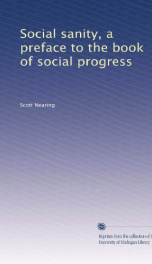
social sanity a preface to the book of social progress
Series:
Unknown
Year:
Unknown
Raiting:
3/5
This volume is produced from digital images created through the University of Michigan University Library's large-scale digitization efforts. The Library seeks to preserve the intellectual content of items in a manner that facilitates and promotes a variety of uses. The digital reformatting process results in an electronic version of the original text that can be both accessed online and used to create new print copies. The Library also understands and values the usefulness of print and makes reprints available to the public whenever possible. This book and hundreds of thousands of others can be found in the HathiTrust, an archive of the digitized collections of many great research libraries. For access to the University of Michigan Library's digital collections, please see http://www.lib.umich.edu and for information about the HathiTrust, please visit http://www.hathitrust.org
Show more
add to favoritesadd In favorites
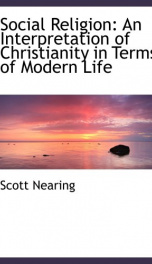
social religion an interpretation of christianity in terms of modern life
Series:
Unknown
Year:
Unknown
Raiting:
3.5/5
This scarce antiquarian book is included in our special Legacy Reprint Series. In the interest of creating a more extensive selection of rare historical book reprints, we have chosen to reproduce this title even though it may possibly have occasional imperfections such as missing and blurred pages, missing text, poor pictures, markings, dark backgrounds and other reproduction issues beyond our control. Because this work is culturally important, we have made it available as a part of our commitment to protecting, preserving and promoting the world's literature. --This text refers to an alternate Paperback edition.
Show more
add to favoritesadd In favorites

poverty and riches a study of the industrial rgime
Series:
Unknown
Year:
Unknown
Raiting:
3/5
Show more
add to favoritesadd In favorites

income an examination of the returns for services rendered and from property ow
Series:
Unknown
Year:
Unknown
Raiting:
4.5/5
Show more
add to favoritesadd In favorites
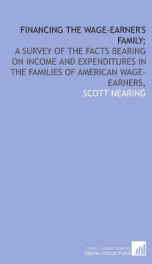
financing the wage earners family a survey of the facts bearing on income and
Series:
Unknown
Year:
Unknown
Raiting:
4/5
Originally published in 1913. This volume from the Cornell University Library's print collections was scanned on an APT BookScan and converted to JPG 2000 format by Kirtas Technologies. All titles scanned cover to cover and pages may include marks, notations and other marginalia present in the original volume.
Show more
add to favoritesadd In favorites

The Next Step
Series:
Unknown
Year:
Unknown
Raiting:
4.5/5
This volume is produced from digital images created through the University of Michigan University Library's preservation reformatting program. The Library seeks to preserve the intellectual content of items in a manner that facilitates and promotes a variety of uses. The digital reformatting process results in an electronic version of the text that can both be accessed online and used to create new print copies. This book and thousands of others can be found in the digital collections of the University of Michigan Library. The University Library also understands and values the utility of print, and makes reprints available through its Scholarly Publishing Office.
Show more
add to favoritesadd In favorites
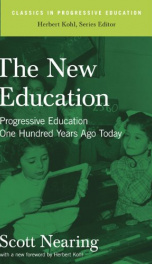
The New Education
Series:
Unknown
Year:
Unknown
Raiting:
4.5/5
Best known for his paean to self-sufficiency, Living the Good Life, which became a bestseller that Newsweek called "an underground bible for the city-weary," Scott Nearing was also a high-profile public advocate for education reform at the start of the Progressive era. Lamenting that public schools had failed to keep up with societal changes, Nearing traveled the country during the early decades of the twentieth century, documenting schools that had abandoned a traditional authoritarian stance in favor of child-centered practice. Now, in the first decade of the twenty-first century, the vignettes, interviews, and speculations on school restructuring, curriculum development, and educational reform that he offered in The New Education a century ago are relevant once again.
Show more
add to favoritesadd In favorites
What readers are saying
What do you think? Write your own comment on this author!
write a commentGenre
- Literature & Fiction / Literary
- Nonfiction / Philosophy
- Law
- Nonfiction / Social Sciences
- Nonfiction / Education / Education Theory / History
- Books / Academic writing
- Law / Study and teaching / Great Britain
- Books / September 11 Terrorist Attacks, 2001
- Business & Investing / Management & Leadership
- Nonfiction / Education / Education Theory / Contemporary Methods
if you like Nearing Scott try:
readers also enjoyed
What readers are saying
What do you think? Write your own comment on this author!
write a commentGenre
- Literature & Fiction / Literary
- Nonfiction / Philosophy
- Law
- Nonfiction / Social Sciences
- Nonfiction / Education / Education Theory / History
- Books / Academic writing
- Law / Study and teaching / Great Britain
- Books / September 11 Terrorist Attacks, 2001
- Business & Investing / Management & Leadership
- Nonfiction / Education / Education Theory / Contemporary Methods
if you like Nearing Scott try:
readers also enjoyed
Do you want to read a book that interests you? It’s EASY!
Create an account and send a request for reading to other users on the Webpage of the book!
